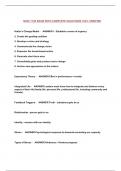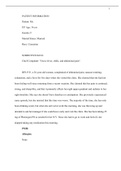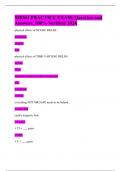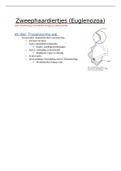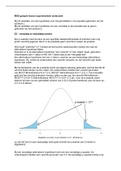SOLUTIONS MANUAL FOR FLUID
MECHANICS 1ST EDITION
HIBBELER
,Fluid Mechanics 1st Edition Hibbeler Solutions Manual
© 2014 Pearson Education, Inc., Upper Saddle River, NJ. All rights reserved. This material is protected under all copyright laws as they currently
exist. No portion of this material may be reproduced, in any form or by any means, without permission in writing from the publisher.
Unless otherwise stated, take the density of water to be
rw = 1000 kg>m3 and its specific weight to be gw =
62.4 lb>ft 3. Also, assume all pressures are gage pressures.
2–1. Show that Pascal’s law applies within a fluid that is
accelerating, provided there is no shearing stresses acting
within the fluid.
Solution
Consider the free-body diagram of a triangular element of fluid as shown in Fig. 2–2b.
If this element has acceleration components of ax, ay, az, then since dm = rdV the
equations of motion in the y and z directions give
1
ΣFy = dmay; py(∆x)(∆s sin u) - 3 p(∆x∆s) 4 sin u = r a ∆x(∆s cos u)(∆s sin u) bay
2
1 1
ΣFz = dmaz; pz(∆x)(∆s cos u) - 3 p(∆x∆s) 4 cos u - g c ∆x(∆s cos u)(∆s sin u) R = r a ∆x(∆s cos u)(∆s sin u) b az
2 2
Dividing by ∆x∆s and letting ∆s S 0, so the element reduces in size, we obtain
py = p
pz = p
By a similar argument, the element can be rotated 90° about the z axis and
ΣFx = dmax can be applied to show px = p. Since the angle u of the inclined face is
arbitrary, this indeed shows that the pressure at a point is the same in all directions
for any fluid that has no shearing stress acting within it.
79
Visit TestBankDeal.com to get complete for all chapters
,© 2014 Pearson Education, Inc., Upper Saddle River, NJ. All rights reserved. This material is protected under all copyright laws as they currently
exist. No portion of this material may be reproduced, in any form or by any means, without permission in writing from the publisher.
Unless otherwise stated, take the density of water to be
rw = 1000 kg>m3 and its specific weight to be gw =
62.4 lb>ft 3. Also, assume all pressures are gage pressures.
2–2. The water in a lake has an average temperature of
15°C. If the barometric pressure of the atmosphere is
720 mm of Hg (mercury), determine the gage pressure and
the absolute pressure at a water depth of 14 m.
Solution
From Appendix A, T = 15°C.
rw = 999.2 kg>m3
pg = rwgh = ( 999.2 kg>m3 )( 9.81 m>s2 ) (14 m)
= 137.23 ( 103 ) Pa = 137 kPa Ans.
patm = rHg gh = ( 13 550 kg>m3 )( 9.81 m>s2 ) (0.720 m) = 95.71 kPa
pabs = patm + pg = 95.71 kPa + 137.23 kPa
= 233 kPa Ans.
Ans:
pg = 137 kPa, pabs = 233 kPa
80
, © 2014 Pearson Education, Inc., Upper Saddle River, NJ. All rights reserved. This material is protected under all copyright laws as they currently
exist. No portion of this material may be reproduced, in any form or by any means, without permission in writing from the publisher.
Unless otherwise stated, take the density of water to be
rw = 1000 kg>m3 and its specific weight to be gw =
62.4 lb>ft 3. Also, assume all pressures are gage pressures.
2–3. If the absolute pressure in a tank is 140 kPa, determine
the pressure head in mm of mercury. The atmospheric
pressure is 100 kPa.
Solution
pabs = patm + pg
140 kPa = 100 kPa + pg
pg = 40 kPa
From Appendix A, rHg = 13 550 kg>m3.
p = gHg hHg
40 ( 10
3
) N>m2 = ( 13 550 kg>m3 )( 9.81 m>s2 ) hHg
hHg = 0.3009 m = 301 mm Ans.
Ans:
hHg = 301 mm
81
MECHANICS 1ST EDITION
HIBBELER
,Fluid Mechanics 1st Edition Hibbeler Solutions Manual
© 2014 Pearson Education, Inc., Upper Saddle River, NJ. All rights reserved. This material is protected under all copyright laws as they currently
exist. No portion of this material may be reproduced, in any form or by any means, without permission in writing from the publisher.
Unless otherwise stated, take the density of water to be
rw = 1000 kg>m3 and its specific weight to be gw =
62.4 lb>ft 3. Also, assume all pressures are gage pressures.
2–1. Show that Pascal’s law applies within a fluid that is
accelerating, provided there is no shearing stresses acting
within the fluid.
Solution
Consider the free-body diagram of a triangular element of fluid as shown in Fig. 2–2b.
If this element has acceleration components of ax, ay, az, then since dm = rdV the
equations of motion in the y and z directions give
1
ΣFy = dmay; py(∆x)(∆s sin u) - 3 p(∆x∆s) 4 sin u = r a ∆x(∆s cos u)(∆s sin u) bay
2
1 1
ΣFz = dmaz; pz(∆x)(∆s cos u) - 3 p(∆x∆s) 4 cos u - g c ∆x(∆s cos u)(∆s sin u) R = r a ∆x(∆s cos u)(∆s sin u) b az
2 2
Dividing by ∆x∆s and letting ∆s S 0, so the element reduces in size, we obtain
py = p
pz = p
By a similar argument, the element can be rotated 90° about the z axis and
ΣFx = dmax can be applied to show px = p. Since the angle u of the inclined face is
arbitrary, this indeed shows that the pressure at a point is the same in all directions
for any fluid that has no shearing stress acting within it.
79
Visit TestBankDeal.com to get complete for all chapters
,© 2014 Pearson Education, Inc., Upper Saddle River, NJ. All rights reserved. This material is protected under all copyright laws as they currently
exist. No portion of this material may be reproduced, in any form or by any means, without permission in writing from the publisher.
Unless otherwise stated, take the density of water to be
rw = 1000 kg>m3 and its specific weight to be gw =
62.4 lb>ft 3. Also, assume all pressures are gage pressures.
2–2. The water in a lake has an average temperature of
15°C. If the barometric pressure of the atmosphere is
720 mm of Hg (mercury), determine the gage pressure and
the absolute pressure at a water depth of 14 m.
Solution
From Appendix A, T = 15°C.
rw = 999.2 kg>m3
pg = rwgh = ( 999.2 kg>m3 )( 9.81 m>s2 ) (14 m)
= 137.23 ( 103 ) Pa = 137 kPa Ans.
patm = rHg gh = ( 13 550 kg>m3 )( 9.81 m>s2 ) (0.720 m) = 95.71 kPa
pabs = patm + pg = 95.71 kPa + 137.23 kPa
= 233 kPa Ans.
Ans:
pg = 137 kPa, pabs = 233 kPa
80
, © 2014 Pearson Education, Inc., Upper Saddle River, NJ. All rights reserved. This material is protected under all copyright laws as they currently
exist. No portion of this material may be reproduced, in any form or by any means, without permission in writing from the publisher.
Unless otherwise stated, take the density of water to be
rw = 1000 kg>m3 and its specific weight to be gw =
62.4 lb>ft 3. Also, assume all pressures are gage pressures.
2–3. If the absolute pressure in a tank is 140 kPa, determine
the pressure head in mm of mercury. The atmospheric
pressure is 100 kPa.
Solution
pabs = patm + pg
140 kPa = 100 kPa + pg
pg = 40 kPa
From Appendix A, rHg = 13 550 kg>m3.
p = gHg hHg
40 ( 10
3
) N>m2 = ( 13 550 kg>m3 )( 9.81 m>s2 ) hHg
hHg = 0.3009 m = 301 mm Ans.
Ans:
hHg = 301 mm
81

